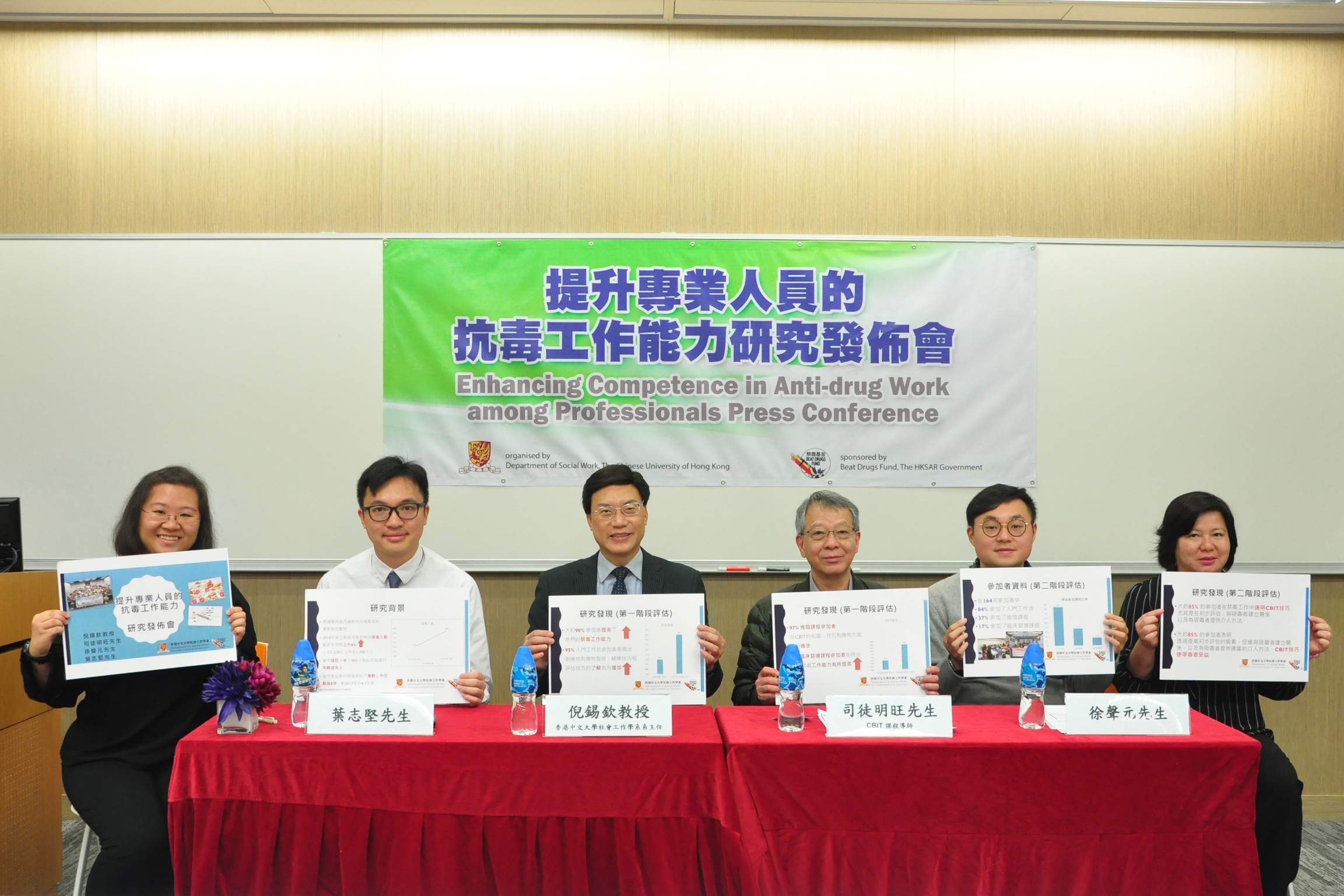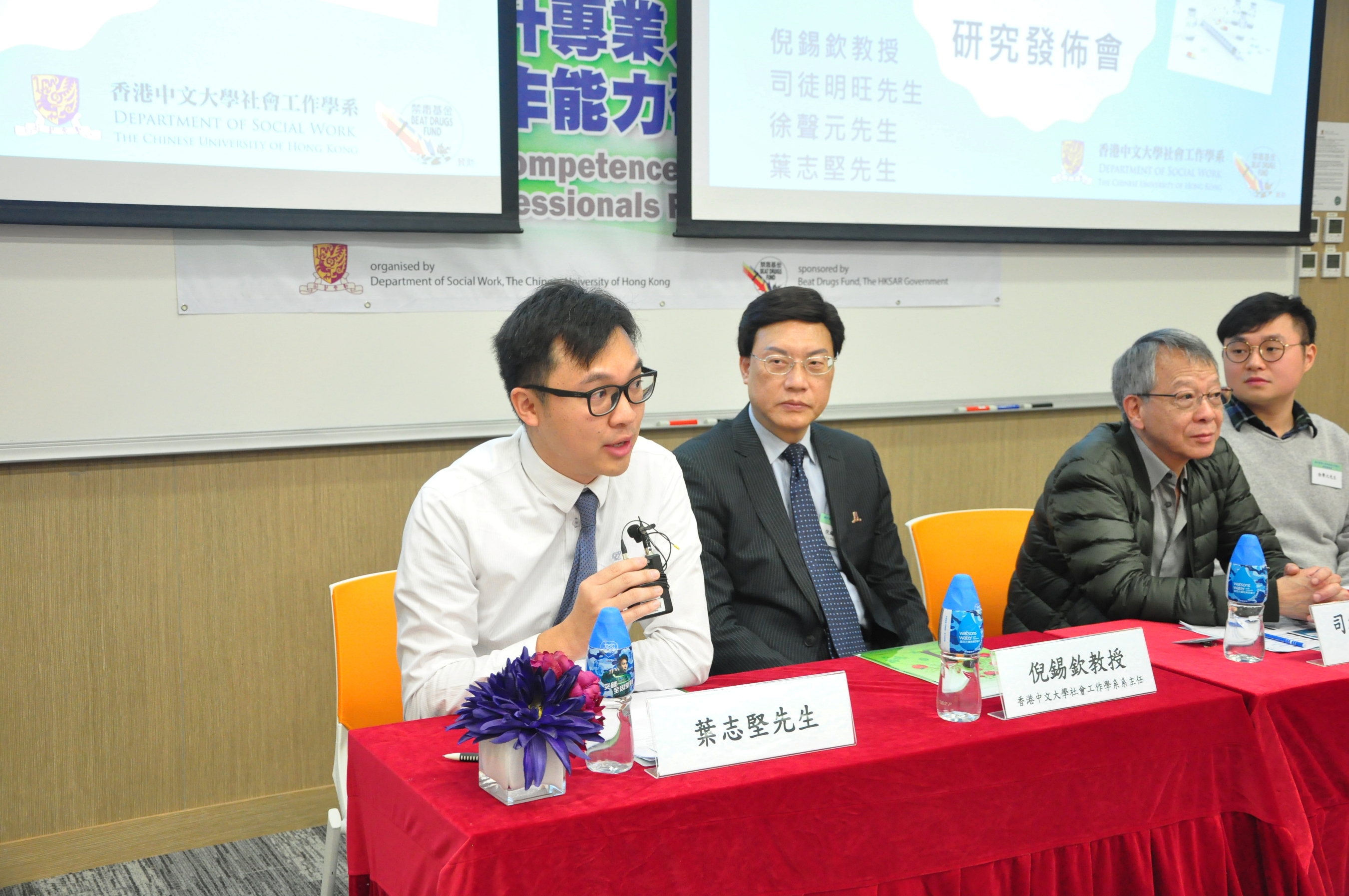CUHK
News Centre
CBIT Training Proves Effective in Enhancing Competence in Anti-drug Work among Professionals
The Department of Social Work at The Chinese University of Hong Kong (CUHK) has conducted a research to evaluate the change of trainees’ competence in anti-drug work, before and after cognitive-behavioral integrated therapy (CBIT) training. The findings showed that CBIT training has achieved significant effectiveness. About 90% of the participants have enhanced their competence in anti-drug work. Approximately 85% of the participants can apply CBIT skills, as a result, helping drug abusers to abstain from drug abuse in a higher successful rate.
Cognitive-behavioral Integrated Therapy Training
Illicit drugs not only bring harm to drug abusers’ physical and mental health, but also affect their study, work, or even family lives, causing them being incapable of playing their roles in the family and society. Additionally, the process of abstaining from drug abuse is usually recurrent because of their irrational thoughts to drug abuse, which has been accumulated since childhood. Consequently, seeking a suitable way to assist drug abusers is the significant responsibility of anti-drug professionals, including social workers, healthcare practitioners, teachers, and students from these professions.
Professor Steven Sek-yum Ngai at Department of Social Work, CUHK, who has dedicated to concerning about the drug abuse problem, has provided the training of CBIT with an aim to collaboratively to identify, challenge and adjust unrealistic beliefs about drugs that maintain problematic use and strengthen behavioral change since 2013. The training includes introductory, advanced and clinical supervision course. Introductory course focuses on drug commonly abused in Hong Kong, counseling guidelines, initial assessment and level of care needed. Advanced course focuses on strategies of CBIT, including engaging and building motivation to change, negotiating some behavior changes, early relapse prevention, relapse prevention, relapse management and working with families and social network members. Clinical supervision focuses on participant reporting cases and analysing cases while trainers supervising the progress of the participants’ interventions, assisting them in practicing the skills learnt in the course.
Research Design
This research involved two phases of evaluation. The design of the first phase was pre-post design to measure all participants’ essential competence (knowledge and skills) pertaining to the training approach, feedback, attendance or attention, background characteristics, and control factors in 2013-2018. The design of the second phase was a follow-up study, which targeted practitioners, in the second half of the year 2018. The aim was to assess the applicability and effectiveness of utilising CBIT skills in anti-drug work. This research employed self-administered questionnaires in both phases of evaluations.
The first phase of evaluation
More than half of the 1791 participants (55%) were professionals such as social workers (48%), healthcare workers (20%) and teachers (32%). 80% of them attended the introductory course, about 17% attended the advanced course and 3% attended the clinical supervision course.
Overall, approximately 90% of participants’ competence in anti-drug work was enhanced. 95% of those who attended introductory course have showed improvement in knowledge about drugs and drugs services, counseling skills and assessment skills. 97% of those who attended advanced course have improvement in knowledge, skills and application of CBIT. Nearly most (98%) of those who attended clinical supervision course showed improvement in competence in clinical anti-drug work.
The second phase of evaluation
Among the 164 participants, 84% attended the introductory course, 37% of the advanced course and 17% attended the clinical course. 82% were from the social work profession, 10% were from healthcare profession and 8% were from teaching profession.
Around 85% of participants have applied CBIT skills in their anti-drug work, particularly in utilising CBIT skills in preliminary evaluations, building relationships with drug abusers and providing interventions for drug abusers most. Similarly, about 85% of participants stated that CBIT skills can help increase the successful rate of drug abstinence through enhancing the quality of preliminary evaluations, facilitating building relationships with drug abusers, and providing suitable interventions.
Sharing of trainees
Mr. Chan, an outreach social worker who attended the clinical supervision course, revealed that the skills learnt from CBIT training assisted him in analysing cases more comprehensively, from the drug abuser’s perspective and their families’ perspective. Besides, reporting and sharing the cases widened his horizon in anti-drug work. For instance, he understood his clients would be more likely to involve in drug abuse if they entered an entertainment venue frequently.
Mr Tsui, an anti-drug social worker who also attended the clinical supervision course, mentioned that tools like the drug abuse log and pattern of taking drugs helped him better understand how a drug abuser think. Furthermore, such tools assisted him in guiding the drug abusers to realise drugs’ harm, who may eventually become more willing to seek drug rehabilitation.
Prof Sek-yum Ngai (3rd left), Mr Max Szeto (3rd right), Mr Ip (2nd left), and Mr Tsui (2nd right), and the team issued the research findings of CBIT Training which proves effective in enhancing competence in anti-drug work among professionals.





